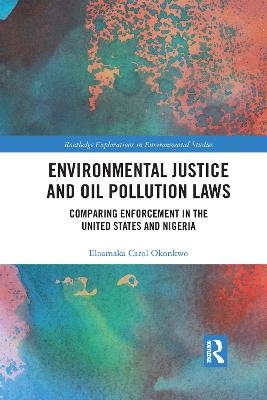
Environmental Justice and Oil Pollution Laws
Comparing Enforcement in the United States and Nigeria
Seiten
2021
Routledge (Verlag)
978-1-032-17383-2 (ISBN)
Routledge (Verlag)
978-1-032-17383-2 (ISBN)
This book explores the relationship between oil pollution laws and environmental justice by comparing and contrasting the United States and Nigeria. It will be of great interest to students and scholars of environmental law, environmental justice, minorities rights, business and human rights, energy law, and natural resource governance.
This book explores the relationship between oil pollution laws and environmental justice by comparing and contrasting the United States and Nigeria.
Critically, this book not only examines the fluidity of oil pollutions laws but also how effective or ineffective enforcement can be when viewed through the lens of environmental justice. Using Nigeria as a case study and drawing upon examples from the United States, it examines the legal and institutional challenges impacting upon the effective enforcement of laws and provides a contrasting view of developed and developing countries. Focusing on the oil and gas industry, the book discusses the laws and international acceptable standards (IAS) in these industries, the principles behind their application, the existing barriers to their effective implementation, and how to overcome those barriers. Utilising an environmental justice framework, the book demonstrates the synergy between policy-making, human rights, and justice in oil-producing regions as well as addressing the importance of protecting the rights of minorities. Through a comparative analysis of the United States and Nigeria, this book draws out enforcement approaches and mechanisms for tackling oil-related pollution with a view to reducing environmental injustice in developing countries. Examining the role of NGOs in pursuing environmental justice matters, the book showed the regional courts as one avenue of overcoming the enforcement challenges faced by the developing countries.
This book will be of great interest to students and scholars of environmental law, environmental justice, minorities' rights, business and human rights, energy law, and natural resource governance.
This book explores the relationship between oil pollution laws and environmental justice by comparing and contrasting the United States and Nigeria.
Critically, this book not only examines the fluidity of oil pollutions laws but also how effective or ineffective enforcement can be when viewed through the lens of environmental justice. Using Nigeria as a case study and drawing upon examples from the United States, it examines the legal and institutional challenges impacting upon the effective enforcement of laws and provides a contrasting view of developed and developing countries. Focusing on the oil and gas industry, the book discusses the laws and international acceptable standards (IAS) in these industries, the principles behind their application, the existing barriers to their effective implementation, and how to overcome those barriers. Utilising an environmental justice framework, the book demonstrates the synergy between policy-making, human rights, and justice in oil-producing regions as well as addressing the importance of protecting the rights of minorities. Through a comparative analysis of the United States and Nigeria, this book draws out enforcement approaches and mechanisms for tackling oil-related pollution with a view to reducing environmental injustice in developing countries. Examining the role of NGOs in pursuing environmental justice matters, the book showed the regional courts as one avenue of overcoming the enforcement challenges faced by the developing countries.
This book will be of great interest to students and scholars of environmental law, environmental justice, minorities' rights, business and human rights, energy law, and natural resource governance.
Eloamaka Carol Okonkwo is a Researcher at the Centre of Environmental Law and Governance, University of Strathclyde, Glasgow, United Kingdom.
Part 1: Setting the Scene 1. Introduction and Background 2. Definitions of Terms Part 2: Key Issues and Players 3. Conceptual Frameworks 4. Conceptual Framework: Enforcement 5. Comparative Analysis of The Legislation Relating to Oil Pollution Matters with a View of Achieving Environmental Justice 6. Oil, Regulatory Enforcement and Environmental Justice in The United States 7. Regulatory and Private Enforcement in Nigeria Part 3: Moving On 8. Frameworks to Advance Environmental Justice in Developing Countries 9. Summary, Conclusion and Recommendations
| Erscheinungsdatum | 01.10.2021 |
|---|---|
| Reihe/Serie | Routledge Explorations in Environmental Studies |
| Zusatzinfo | 5 Illustrations, black and white |
| Verlagsort | London |
| Sprache | englisch |
| Maße | 156 x 234 mm |
| Gewicht | 430 g |
| Themenwelt | Naturwissenschaften ► Biologie ► Ökologie / Naturschutz |
| Naturwissenschaften ► Geowissenschaften ► Geografie / Kartografie | |
| Recht / Steuern ► Allgemeines / Lexika | |
| Recht / Steuern ► EU / Internationales Recht | |
| Sozialwissenschaften ► Politik / Verwaltung ► Vergleichende Politikwissenschaften | |
| Sozialwissenschaften ► Soziologie ► Spezielle Soziologien | |
| Wirtschaft ► Volkswirtschaftslehre | |
| ISBN-10 | 1-032-17383-1 / 1032173831 |
| ISBN-13 | 978-1-032-17383-2 / 9781032173832 |
| Zustand | Neuware |
| Haben Sie eine Frage zum Produkt? |
Mehr entdecken
aus dem Bereich
aus dem Bereich


